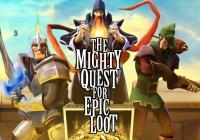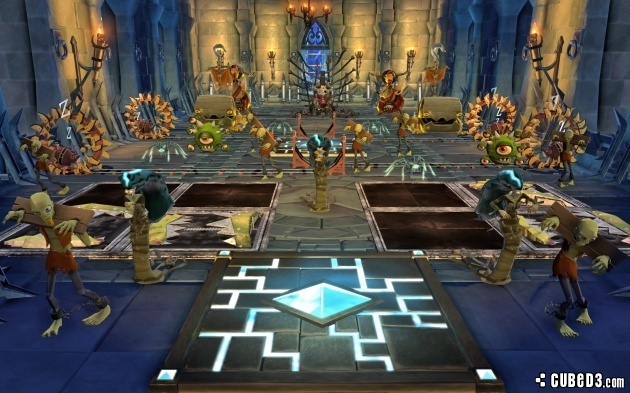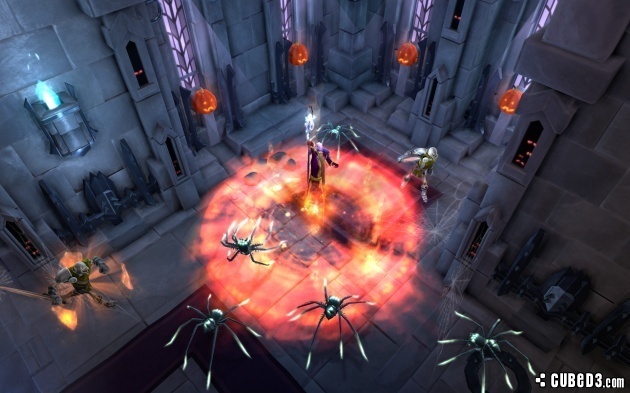The Mighty Quest for Epic Loot (PC) Review
By Javier Jimenez  07.03.2014
07.03.2014

The Mighty Quest for Epic Loot is anything but another Diablo-clone. There's the loot grind, sure, but there's also dungeon building complete with online. Yes, that means running through other adventurer's castles, smashing through dank, dark hallways, crushing their monsters, and stealing their precious, precious gold, not to mention lowering their overall ranking. It's enough to catch any RPG fan's eye - a dream scenario that only gleefully evil chortles could adequately express.
There is another side to MQEL, though. It is the nasty side of modern gaming with all the scariest buzzwords: online only, free-to-play, real money commodity purchases. That side of the game where the best healing is potions, which can only be purchased with gold, a time limited resource generated by the player's dungeon or taken from raids. Or the potions can be purchased with "Blings", a game currency that can be bought with real money (fear not, there is indeed a BEST VALUE Bling package).
Those words are enough to give a gamer nightmares of MBA driven design meetings, wherein marketers identify the highest point on an average revenue per minute graph, a dark 8-18-year-old demographic targeting vision of where the gaming industry might wind its way to, the sort of EA-led dystopia wherein gamers slave away spending 24 hours breaking just one block out of hundreds of blocks of a wall unless they pay their way out of their Sisyphusian hell.
Thankfully, Mighty Quest is not said nightmare. There was concern regarding the pay-to-win nature of the game prior to its current beta state, however, this review can only speak of its current state. And in its current state, Mighty Quest is well balanced insofar as its economy is concerned. While purchasing "Blings" will give a player an advantage, allowing them to "win" their castle raids more easily, to buy more equipment and potions and whatnot, it will... 1) not allow them to win where other players (those who do not purchase Blings with real money) can not given a reasonable amount of time, and 2) not detract in any way from the enjoyment those who do not spend real money may have with the game.

That said, those who strictly do not purchase anything with real world cash will have to grind out in-game currency, gold and life force, in order to progress. This can be done by letting a castle's gold mines fill up, periodically emptying them into the coffers. Or it can be done by raiding other castles, killing monsters and grabbing loot. Either way, it means time. Doing so does not require an unreasonable amount of time, though.
Note that the player may only choose one of three base characters for free - the Mage, the Knight, or the Archer. After that, each new character costs approximately $10. Additionally, the rockstar "Runaway" class may not be selected by a free account and may only be purchased for approximately $10.
This is all commendable stuff for Ubisoft. Resisting the call of microtransactions is no easy task for a profit driven business. And catering to the desires of "core gamers" may seem like poor business, though it is very arguably a better long term strategy. Nor is balancing game economy in such a fashion an easy task. So cheers to them.
The Mighty Quest for Epic Loot's game balance is another story, however. For its time, Dungeon Keeper was a miracle of engineering and design. Carving freeform hallways and rooms out of rock was a joy, as was zoning said rooms for different purposes, filling the dungeon with monsters, and leveling everything up high enough to withstand the incessant adventurers who wished to bash everything apart in the hunt for gold and renown. Sadly, MQEL's castle building is not as elegant as Dungeon Keeper.

MQEL's building is far more restrictive. Players can only buy and cobble together from pre-designed rooms, for instance, three to four rooms for a low level castle. There is a cap on how many monsters and items may be placed based on the "castle heart's" level (increased with life force). Placing traps is dependent on also placing nearby energy generators. There are no "events" or quests for the player to add; only rooms, traps, and monsters. And placable resources are capped such that castles are never more than a couple of minutes to run through.
It all sort of defeats the creative joy of building. Thus, players fall back on a handful of optimal defenses, such as zekes with headshot or spring board traps surrounded by slime walls. It is a rare occurence when one runs into actually creative castles (which inevitably are not challenging).
So, that leaves the Diablo-clone side of the equation. And it's not bad, really. While it's no Diablo 2 or even Diablo 3 with Loot 2.0, it's servicable, enjoyable and fun. It definitely scratches the click, click, click, loot, loot, loot itch. Watching characters grow is rewarding. Finding rare or legendary items lights that special spot reserved in every RPG fan's brain.
Even with the limited skill customization (choose up to three hotbar skills and one right click skill), it's only the limited dungeon design that holds the action side of Mighty Quest back from being a real full-fledged RPG. Sadly, the three to four minute, ultra linear castle raids do not satisfy. And before long, in just a handful of hours, the game will feel like a grind. It doesn't help that there is very clearly a "best" class (Knight) and very clearly a "worst" class (Archer).

While the promise of community interaction would seemingly obviate these flaws, the lack of ability to create and express with the dungeon creation tools denies players any ability to transcend the limitations of the game design. Should the game's developers find a way to allow players more dungeon design options, this may change.
It is worth noting that MQEL has nice visual design. The game art style is nicely cartoonish, with quality texture mapping. Character models are professional, well crafted, well animated, appropriate to the theme, and entertaining. Even player equipment is fun to look at, with intelligent jabs at fantasy standards, swords encrusted with gems from blade to hilt, axes that have a dozen jabby bits, and hats with candles on them.
Overall composition is excellent, as well. Looking out over Opulencia's floating castles is a sight. It is a scene that evokes the idea behind Mighty Quest: see all these places to go, this big community, drop in, raid a dungeon, build a dungeon. If nothing else, Mighty Quest's artists did their part of the job.
Sound isn't much worse. Good fantasy music accompanies everything. Swords slash, monsters howl and groan and gurgle and splat. Voice acting is fairly good - never outright awful, though sometimes grating depending on the character, and sometimes very good.

Cubed3 Rating
Good
It is worth noting that The Mighty Quest for Epic Loot is currently in beta. It is also worth noting that at release, even the biggest, baddest of all time, Diablo 2, was buggy, broken, unbalanced, and lacking content. It took years of patches and expansions to smooth out Diablo 2's problems, implement all its content, and reach the heights of design excellence for which it is revered.
If Mighty Quest's designers remain dedicated, they may achieve the promise of the game's very interesting premise. However, today it is a light action RPG with some fluff dungeon building and multiplayer functionality bolted on.
If this sounds negative, it is not. At the price of $0, there is no reason not to play The Mighty Quest of Epic Loot today. There is fun to be had here. However, do so with an open mind, because as it stands the game is not done.
Comments
Comments are currently disabled

 Sign In
Sign In Game Details
Game Details
 Out now
Out now  Out now
Out now  None
None  Out now
Out now  Subscribe to this topic
Subscribe to this topic Features
Features






 Top
Top

